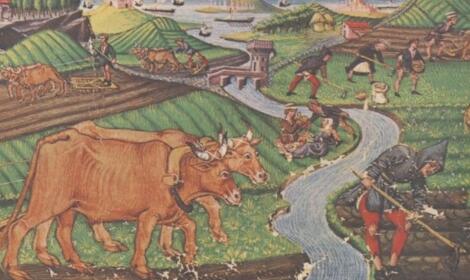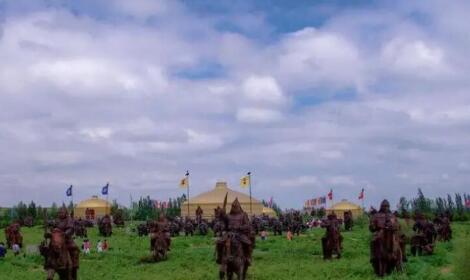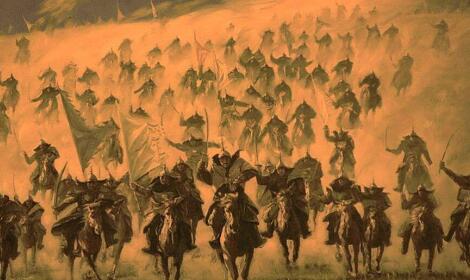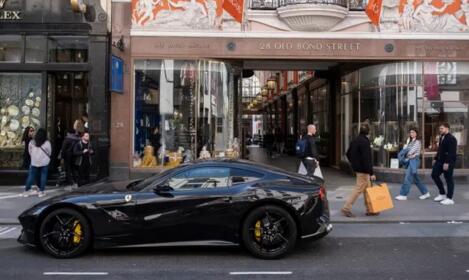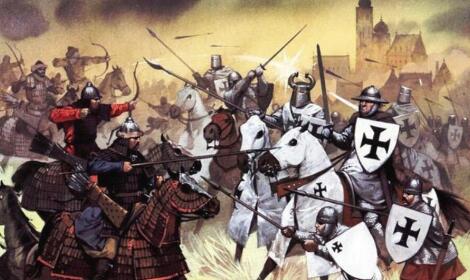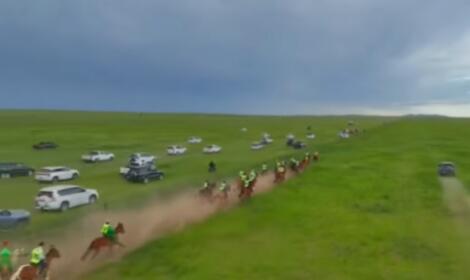"亚洲游牧民族和定居民族之间的冲突塑造了历史……" 为什么成吉思汗不利用征服得来的财富和资源来发展蒙古?(二)
正文翻译

Why didn’t Genghis Khan use the wealth and resources from his conquest to develop Mongolia?
为什么成吉思汗不利用征服得来的财富和资源来发展蒙古?(二)

Why didn’t Genghis Khan use the wealth and resources from his conquest to develop Mongolia?
为什么成吉思汗不利用征服得来的财富和资源来发展蒙古?(二)
评论翻译
Yong Jian-Yi
Genghis Khan was a member of a society of people who were pastoralist, nomadic herdsmen whose notion of wealth is the size of their herd, horses and fighting prowess. Civilization is one of a constant conflict between pastoralist and agriculturalist. One moves around to new ground after depleting the land, to allow it to regrow. The other develops the land , build walls and cities. To Genghis Khan, his idea of development is different.
成吉思汗是一个游牧民族社会的一员,他们的财富是他们的牛群,马匹和勇猛战斗。
文明是牧民和农民之间不断冲突的产物。在耗尽土地后,人们会转移到新的土地上,让它重新生长。另一个则开发土地,建造城墙和城市。就成吉思汗而言,他的发展理念是不同的。
链接:《亚洲游牧民族和定居民族之间的冲突塑造了历史》
The relationship between settled peoples and nomads has been one of the great engines driving human history since the invention of agriculture and the first formation of towns and cities. It has played out most grandly, perhaps, across the vast expanse of Asia.
North African historian and philosopher Ibn Khaldun (1332-1406) writes about the dichotomy between townsfolk and nomads in "The Muqaddimah." He claims that nomads are savage and similar to wild animals, but also braver and more pure of heart than city dwellers.
"Sedentary people are much concerned with all kinds of pleasures. They are accustomed to luxury and success in worldly occupations and to indulgence in worldly desires."
By contrast, nomads "go alone into the desert, guided by their fortitude, putting their trust in themselves. Fortitude has become a character quality of theirs, and courage their nature."
Neighboring groups of nomads and settled people may share bloodlines and even a common language, as with Arabic-speaking Bedouins and their citified cousins. Throughout Asian history, however, their vastly different lifestyles and cultures have led to both periods of trade and times of conflict.
《亚洲游牧民族和定居民族之间的冲突塑造了历史》
自农业发明和城镇第一次形成以来,定居民族和游牧民族之间的关系一直是推动人类历史的巨大引擎之一。也许,在广袤的亚洲地区,这种情况最为壮观。
北非历史学家和哲学家伊本·赫勒敦(1332-1406)在《Muqaddimah》一书中描述了城镇居民和游牧民族之间的对立。他声称,游牧民族是野蛮的,类似于野生动物,但也比城市居民更勇敢,内心更纯洁。
“定居的人很关心各种乐趣。他们习惯于世俗的奢侈和成功,沉溺于世俗的欲望。”
相比之下,游牧民族“在刚毅的指引下,相信自己,独自进入沙漠。坚韧已经成为他们的一种性格品质,而勇气则是他们的天性。”
邻近的游牧民族和定居的人可能有共同的血统,甚至有共同的语言,就像说阿拉伯语的贝都因人和他们的城市表亲一样。然而,纵观亚洲历史,他们截然不同的生活方式和文化导致了贸易时期和冲突时期。
Trade Between Nomads and Towns
Compared with townspeople and farmers, nomads have relatively few material possessions. Items they have to trade may include furs, meat, milk products, and livestock (such as horses). They need metal goods such as cooking pots, knives, sewing needles, and weapons, as well as grains or fruit, cloth, and other products of sedentary life. Lightweight luxury items, such as jewelry and silks, may have great value in nomadic cultures, as well. Thus, there is a natural trade imbalance between the two groups. Nomads often need or want more of the goods that settled people produce than the other way around.
游牧民族与城镇居民之间的贸易
与城镇居民和农民相比,游牧民族的物质财富相对较少。他们必须交易的物品可能包括毛皮、肉类、奶制品和牲畜(如马)。他们需要金属物品,如炊具、刀具、缝纫针和武器,以及谷物或水果、布料和其他定居产品。轻量的奢侈品,如珠宝和丝绸,在游牧文化中也可能有很大的价值。因此,这两个群体之间存在着天然的贸易不平衡。游牧民通常需要或想要更多的定居居民生产的商品,而不是相反。
Nomadic people have often served as traders or guides in order to earn consumer goods from their settled neighbors. All along the Silk Road that spanned Asia, members of different nomadic or semi-nomadic peoples such as the Parthians, the Hui, and the Sogdians specialized in leading caravans across the steppes and deserts of the interior. They sold the goods in the cities of China, India, Persia, and Turkey. On the Arabian Peninsula, the Prophet Muhammad himself was a trader and caravan leader during his early adulthood. Traders and camel drivers served as bridges between the nomadic cultures and the cities, moving between the two worlds and conveying material wealth back to their nomadic families or clans.
游牧民族经常担任商人或向导,以便从定居的邻居那里赚取消费品。沿着横跨亚洲的丝绸之路,不同游牧或半游牧民族的成员,如帕提亚人、回族和粟特人,专门带领商队穿越内陆的草原和沙漠。
他们把货物卖到中国、印度、波斯和土耳其的城市。在阿拉伯半岛,先知穆罕默德本人在他成年早期是一名商人和商队首领。商人和骆驼车夫充当了游牧文化和城市之间的桥梁,在两个世界之间穿梭,将物质财富输送回游牧家庭或部落。
In some cases, settled empires established trade relations with neighboring nomadic tribes. China often organized these relationships as a tribute. In return for acknowledging the Chinese emperor's overlordship, a nomadic leader would be allowed to exchange his people's goods for Chinese products. During the early Han era, the nomadic Xiongnu were such a formidable threat that the tributary relationship ran in the opposite direction: the Chinese sent tribute and Chinese princesses to the Xiongnu in return for a guarantee that the nomads would not raid Han cities.
在某些情况下,定居的帝国与邻近的游牧部落建立了贸易关系。中国经常组织这些关系作为贡品。作为承认中国皇帝的统治权的回报,一个游牧民族的领袖将被允许用他的人民的货物交换中国的产品。
在汉朝早期,游牧的匈奴是一个巨大的威胁,朝贡关系朝着相反的方向发展:中国向匈奴输送贡品和中国公主,以换取游牧民族不会袭击汉朝城市的保证。
Conflicts Between Settled People and Nomads
When trade relations broke down, or a new nomadic tribe moved into an area, conflict erupted. This might take the form of small raids on outlying farms or unfortified settlements. In extreme cases, entire empires fell. Conflict pitted the organization and resources of the settled people against the mobility and courage of the nomads. The settled people often had thick walls and heavy guns on their side. The nomads benefited from having very little to lose.
In some cases, both sides lost when the nomads and city dwellers clashed. The Han Chinese managed to smash the Xiongnu state in 89 CE, but the cost of fighting the nomads sent the Han Dynasty into an irreversible decline.
定居民族与游牧民族的冲突
当贸易关系破裂,或者一个新的游牧部落迁入一个地区时,冲突就会爆发。可能采取对偏远农场或未设防的定居点进行小规模袭击的形式。在极端的情况下,整个帝国都会因此而崩溃。冲突使定居居民的组织和资源与游牧民的流动性和勇气相对抗。定居下来的人通常有厚墙和重枪。游牧民族受益于几乎没有什么可失去的。
在某些情况下,当游牧民族和城市居民发生冲突时,双方都是输家。汉人在公元89年成功地摧毁了匈奴,但与游牧民族作战的代价使汉朝陷入了不可逆转的衰落。
In other cases, the ferocity of the nomads gave them sway over vast swathes of land and numerous cities. Genghis Khan and the Mongols built the largest land empire in history, motivated by anger over an insult from the Emir of Bukhara and by the desire for loot. Some of Genghis's descendants, including Timur (Tamerlane) built similarly impressive records of conquest. Despite their walls and artillery, the cities of Eurasia fell to horsemen armed with bows.
Sometimes, the nomadic peoples were so adept at conquering cities that they themselves became the emperors of settled civilizations. The Mughal emperors of India were descended from Genghis Khan and from Timur, but they set themselves up in Delhi and Agra and became city dwellers. They did not grow decadent and corrupt by the third generation, as Ibn Khaldun predicted, but they did go into a decline soon enough.
在其他情况下,游牧民族的残暴使他们控制了大片土地和众多城市。成吉思汗和蒙古人建立了历史上最大的陆地帝国,动机是对来自布哈拉穆斯林酋长侮辱的愤怒和对掠夺的渴望。成吉思汗的一些后裔,包括帖木儿)也建立了同样令人印象深刻的征服记录。尽管有城墙和大炮,欧亚大陆的城市还是落入了手持弓箭的骑兵手中。
有时,游牧民族是如此擅长征服城市,以至于他们自己成为定居文明的皇帝。印度的莫卧儿王朝皇帝是成吉思汗和帖木儿的后裔,但他们定居在德里和阿格拉,并成为城市居民。他们并没有像伊本·赫勒敦预测的那样,在第三代的时候变得颓败和腐败,但他们依然很快就走向了衰落。
Nomadism Today
As the world grows more populated, settlements are taking over open spaces and hemming in the few remaining nomadic peoples. Out of about seven billion humans on Earth today, only an estimated 30 million are nomadic or semi-nomadic. Many of the remaining nomads live in Asia.
Approximately 40 percent of Mongolia's three million people are nomadic. In Tibet, 30 percent of the ethnic Tibetan people are nomads. All across the Arab world, 21 million Bedouin live their traditional lifestyle.
如今的游牧文化
随着世界人口的增长,定居点逐渐占据了开阔的空间,并将仅存的少数游牧民族包围起来。今天地球上大约有70亿人,估计只有3000万人是游牧或半游牧民族。许多游牧民族生活在亚洲。
(外)蒙古300万人口中大约40%是游牧民族。在西藏,30%的藏族人是游牧民族。在整个阿拉伯世界,有2100万贝都因人过着传统的生活方式。
In Pakistan and Afghanistan, 1.5 million of the Kuchi people continue to live as nomads. Despite the Soviets' best efforts, hundreds of thousands of people in Tuva, Kyrgyzstan, and Kazakhstan continue to live in yurts and follow the herds. The Raute people of Nepal also maintain their nomadic culture, though their numbers have fallen to about 650.
At present, it looks as though the forces of settlement are effectively squeezing out the nomads around the world. However, the balance of power between city-dwellers and wanderers has shifted innumerable times in the past. Who can say what the future holds?
在巴基斯坦和阿富汗,150万库奇人继续过着游牧生活。尽管苏联人尽了最大的努力,在图瓦、吉尔吉斯斯坦和哈萨克斯坦,仍有数十万人继续住在蒙古包里,跟随畜群。尼泊尔的劳特人也保持着他们的游牧文化,尽管他们的人数已经下降到大约650人。
目前看来,似乎定居的力量正在有效地排挤世界各地的游牧民族。然而,城市居民和游牧民族之间的力量平衡在过去已经发生了无数次的变化。谁能说未来会怎样呢?
Jacob Dorey
(I edited this beginning sentence here because it came across as disrespectful)
I disagree with what Susanna has to say about the Mongol empire along with Steppe tribes in general. Susanna assumes that because the Mongols slaughtered people, and because they enjoyed conquest that they did not use their wealth and resources to develop Mongolia. Susanna effectively says that all Steppe peoples over thousands of years or more of history behaved the same way, and had the same culture throughout that insanely large span of time. Susanna also has not done any research because they have completely ignored the fact that many states were set up by the Mongols along with cities. Russia as we know it today wouldn’t exist without the Mongols, and guess what? Steppe peoples before the Mongols came to power set up a powerful kingdom in Europe, Hungary.
(我编辑了开头的这句话,因为它给人的感觉不太尊重)
我不同意Susanna对蒙古帝国和草原部落的看法。(注:Susanna的答复将在第三篇呈上)Susanna认为,因为蒙古人屠杀平民,因为他们享受征服,所以他们没有利用他们的财富和资源来发展蒙古。Susanna实际上是在说,在几千年或更长的历史长河中,所有草原民族的行为都是一样的,在那么长的时间跨度里,他们拥有同样的文化。苏珊娜也没有做任何研究,因为他们完全忽略了一个事实,即蒙古人在建立城市的同时还建立了许多国家。
如果没有蒙古人,我们今天的俄罗斯就不会存在,你猜怎么着?在蒙古人掌权之前,草原民族在欧洲建立了一个强大的王国——匈牙利。
All German people are also descended from “Germanic” (not a historical term) nomadic tribes. All Slavs were originally nomadic too. I am just stunned that so many people would immediately believe Susanna’s biased perspective on the issue blindly upvoting their answer. They also mentions that and I quote “The real exception on Mongols were that they had literacy, ideology and discipline.” effectively contradicting points they state in their answer. Were They really just another steppe tribe then? Really? Do all other steppe groups do this? They flat out stated they were different from the other whilst also saying in their answer that they ARE the same. That’s like saying all kingdoms of Europe are the same because they are non-nomadic and generally Christian. Anyone who has looked into this knows they aren’t the same, and they don’t even behave the same.
所有的德国人都是“日耳曼”(不是一个历史术语)游牧部落的后裔。所有斯拉夫人最初也是游牧民族。我只是很震惊,这么多人会立即相信Susanna在这个问题上的偏见观点,盲目地点赞他们的答案。他们还提到,我引用一下"蒙古人真正的例外是他们有读写能力,意识形态和纪律。"这有效地反驳他们在回答中陈述的观点。
他们真的只是另一个草原部落吗?真的吗?其他草原族群都这样吗?他们直截了当地说他们不同于其他人,同时也在他们的回答中说他们是一样的。这就像是说欧洲所有的王国都是一样的,因为它们不是游牧民族,而且普遍都是基督徒。任何研究过这个问题的人都知道,他们是不一样的,甚至他们的行为也不一样。
The Mongols also set up a city called Karakorum - Wikipedia Which is also mentioned here so do not try to dispute this Mongol Trade: lixing East to West - History under Ogedai Khan. Look, I know the OP is asking about Genghis, but the way Susanna just waves off the Mongols as bloodthirsty conquerors is ludicrous especially considering that they treated their subjects well, at least those who didn’t resist, and in turn, treated them with respect. The morality of the Mongols is something we don’t understand completely, but it was completely different than today so judging their morals based on today’s morals doesn’t quite work. They did lots of evil things even by period standards, but consider the morals of their neighbours and you will understand why. It also must be noted that they followed the basic rule of siege warfare which was universal. That being, if you surrendered, you would be spared and if you didn’t, there could be huge consequences. So were they really always that much more evil?
蒙古人还建立了一个叫做哈拉和林的城市,维基里也提到了,所以不要试图质疑《蒙古的贸易:连接东西方——窝阔台汗统治下的历史》。听着,我知道提问者问的是成吉思汗,但Susanna只是把蒙古人视为嗜血的征服者,这是荒谬的,尤其是考虑到他们对他们的臣民很好,至少那些没有抵抗的人,反过来,后者尊重他们。蒙古人的道德是我们不完全了解的东西,它与今天完全不同,所以根据今天的道德来判断他们的道德是不太适用的。即使按照当时的标准,他们也做了很多邪恶的事情,但考虑到他们邻居的道德,你就会明白原因了。
还必须指出的是,他们遵循的是普遍存在的攻城战的基本规则。那就是,如果你投降了,你就得以幸免,如果你不投降,可能会有巨大的后果。所以他们真的总是那么邪恶吗?
Genghis Khan did not set up cities but he was busy developing his empire, and the Mongols were always traditionally nomadic so why go through the huge expense of changing their lifestyle? It was better to maintain the status quo while the Mongols integrate themselves into other populations. This must be understood, the Mongols didn’t just leave the territories they lost. They became Arabs, Russians, Chinese etc etc . So it just isn’t that simple. Ogedei Khan then built Karkorum when the empire had settled down some, and much economic development took place under the pax Mongolica which Susanna completely ignores. Genghis also did in fact develop Mongolia by changing laws, and doing other things like this.
成吉思汗没有建立城市,但他忙于发展他的帝国,蒙古人一直是传统的游牧民族,所以为什么要花费巨大的成本来改变他们的生活方式呢?在蒙古人融入其他民族的同时,最好保持现状。必须明白的是,蒙古人并不只是离开他们失去的领土。他们变成了阿拉伯人,俄罗斯人,中国人等等。所以事情并没有那么简单。窝阔台汗在帝国已经定居下来的时候建造了哈拉和林,在Susanna完全忽视的蒙古和平下,经济得到了很大的发展。事实上,成吉思汗也通过改变法律和其他类似的事情来发展了蒙古。
No matter what number of evil things the Mongols did you can’t deny the good they did either. The same goes for the Nazi Regime which was among the most evil of its kind. Even under such a regime some good did come such as economic and technological development. It came at the cost of so many innocent lives and was unspeakably evil but you still can’t automatically say that they did nothing good. History isn’t black and white.
Are they really just another Steppe tribe? Think about this critically. Think about the cultural diversity that exists to this day among many groups of people. Also, think about the achievements of other tribes.
不管蒙古人做了多少坏事,你也不能否认他们做了多少好事。纳粹政权也是如此,它是同类中最邪恶的政权之一。即使在这样的政权下,经济和技术的发展也带来了一些好处。它以许多无辜的生命为代价,是无法形容的邪恶,但你仍然不能自动地说他们没有做任何好事。历史不是黑白分明的。
他们真的只是另一个草原部落吗?批判性地思考这个问题。想想至今仍存在于许多人群中的文化多样性。另外,想想其他部落的成就。
Mert Toker
Susanna Viljanen wrote a nice answer on the platform. Actually, it was my first answer. I thought in similar way. Open spaces, freedom etc. Then I thought to myself. All humans started as hunter gatherers or freedom lovers. In a way they were all nomads and they had their own spaces either on land or sea etc. Some of them built civilizations some did not...( or less) Actually everybody loved freedom, it was not something new. Then why Sumerians built cities and walls, others did not?
Maybe even in Mongol case it is about self defence. Why we do not apply Maslow's Hierarchy of Needs in this context?
'' Maslow's hierarchy of needs is a motivational theory in psychology comprising a five-tier model of human needs, often depicted as hierarchical levels within a pyramid. Needs lower down in the hierarchy must be satisfied before individuals can attend to needs higher up. From the bottom of the hierarchy upwards, the needs are: physiological, safety, love and belonging, esteem and self-actualization. '' Source of the quotation: https://www.simplypsychology.org/maslow.html
Susanna Viljanen写了一个很好的答案。事实上,这是我的第一个答案。我也是这样想的。开放空间,自由等等。然后我想。所有人类一开始都是狩猎采集者或自由爱好者。在某种程度上,他们都是游牧民族,他们在陆地或海上等都有自己的空间。他们中的一些人建立了文明,一些人没有。实际上每个人都爱自由,这不是什么新鲜事。那么为什么苏美尔人建造了城市和城墙,其他人却没有呢?
也许哪怕是在蒙古,这也是关于自卫的。为什么我们不把马斯洛的需求层次理论应用到这种情况下呢?
“马斯洛需求层次理论是心理学中的一种动机理论,包括人类需求的五层模型,通常被描述为金字塔中的层次。层次结构中较低层次的需求必须得到满足,个人才能满足较高层次的需求。从层次的最底层往上,需求分别是:生理需求、安全需求、爱和归属感需求、尊重需求和自我实现需求。”
When we check historical immigration numbers actually we see that many Turkic and Mongolic races immigrated to lands of China, Persia etc. and actually they became part of urbanized life. ''Civilization'' to speak of... Then what happened?
They lost their identity and melted down in great pot of China or Persia...( Less in Persia,intermixture) Therefore as Maslow states safety is an important aspect. Mongol population was small and when they conquered China they wanted to be a part of civilized life, they even contributed to usage of paper Money, banking etc during Kublai Khan era. Bejing is the capital city of China because of Mongols...
They contributed to civilisation and they were cultural carriers as well... Trade routes became safe and information went freely Asia to Europe or vice versa... East and West met via their horse mobility... However development and civilisation comes with a cost... It is cultural safety.... Turkish cuisine is wonderful however many youngsters eat at Mc Donalds when they are low budget or time hurry... Then let's say they go to movies to watch Spiderman shot in New York. Somehow it is a cultural change afterwards...
当我们检查历史移民数字时,我们发现许多突厥和蒙古族移民到中国和波斯等地,实际上他们成为城市化生活的一部分,也即所谓的“文明”……然后发生了什么?
他们失去了自己的身份,在中国或波斯的大锅里熔化了 (波斯同化相对更少,更多是相互混合)。因此,正如马斯洛所说,安全是一个重要的方面。蒙古人口很少,当他们征服中国时,他们想成为文明生活的一部分,他们甚至在忽必烈时代为纸币和银行等的使用做出了贡献。因为蒙古人,北京成为了中国的首都。
他们为文明做出了贡献,也是文化的载体。贸易路线变得安全,信息自由地从亚洲到欧洲,反之亦然。东方和西方通过马匹相遇。然而,发展和文明是有代价的,这是文化安全。土耳其菜很好吃,但很多年轻人在预算低或时间急的时候只会去麦当劳。然后假设他们去看在纽约拍摄的《蜘蛛侠》。不知何故,这是后来的一种文化变化。
There are interesting statistics online about immigration patterns of Turkic people which shows us that many immigrated to China as well as to West.... They lost their identity in China because it was already populated and had a strong cultural background. Uygurs kept their identity because China annexed their lands just in 20 th century. Immigrated Mongols lost their identity in China or Persia and eventually they have been dominated by others...
When it comes to Mongols, they knew how to run empires and they used Chinese , Persian, Christian statesmen in their state affairs. They were very open to improvement. They were not just savages with bows and arrows.... If it was like that we could talk about Commanche empire, Sioux empire which dominated White people.The reason we are discussing this issue because Mongols are over achievers.
In summary, Mongols did not ''develop'' Mongolia because of their safety. They got their power from core lands and they needed the land püre , traditional and ''untouched''. When they build Chinese style palaces, it is not Mongolia anymore, it is China. Maybe safety came first and probably the most of important type of safety : A cultural one...
网上有关于突厥人移民模式的有趣统计数据,向我们展示了许多移民去了中国和西方。他们在中国失去了自己的身份,因为中国已经有了人口,有了强大的文化背景。……移民的蒙古人在中国或波斯失去了自己的身份,最终被其他国家所统治。
至于蒙古人,他们知道如何管理帝国,他们在国家事务中使用中国人、波斯人、基督教政治家。他们非常愿意改进。他们不只是拿着弓箭的野蛮人。
我们讨论这个问题的原因是蒙古人太成功了。总而言之,蒙古人没有“发展”蒙古是出于安全考虑。他们从核心土地获得资源,他们需要土地,传统的和“原始的”。当他们建造中国式宫殿时,就不再是蒙古了,而是中国了。也许安全是第一位的,而且,“文化安全”可能是最重要的一种安全。
Genghis Khan was a member of a society of people who were pastoralist, nomadic herdsmen whose notion of wealth is the size of their herd, horses and fighting prowess. Civilization is one of a constant conflict between pastoralist and agriculturalist. One moves around to new ground after depleting the land, to allow it to regrow. The other develops the land , build walls and cities. To Genghis Khan, his idea of development is different.
成吉思汗是一个游牧民族社会的一员,他们的财富是他们的牛群,马匹和勇猛战斗。
文明是牧民和农民之间不断冲突的产物。在耗尽土地后,人们会转移到新的土地上,让它重新生长。另一个则开发土地,建造城墙和城市。就成吉思汗而言,他的发展理念是不同的。
链接:《亚洲游牧民族和定居民族之间的冲突塑造了历史》
The relationship between settled peoples and nomads has been one of the great engines driving human history since the invention of agriculture and the first formation of towns and cities. It has played out most grandly, perhaps, across the vast expanse of Asia.
North African historian and philosopher Ibn Khaldun (1332-1406) writes about the dichotomy between townsfolk and nomads in "The Muqaddimah." He claims that nomads are savage and similar to wild animals, but also braver and more pure of heart than city dwellers.
"Sedentary people are much concerned with all kinds of pleasures. They are accustomed to luxury and success in worldly occupations and to indulgence in worldly desires."
By contrast, nomads "go alone into the desert, guided by their fortitude, putting their trust in themselves. Fortitude has become a character quality of theirs, and courage their nature."
Neighboring groups of nomads and settled people may share bloodlines and even a common language, as with Arabic-speaking Bedouins and their citified cousins. Throughout Asian history, however, their vastly different lifestyles and cultures have led to both periods of trade and times of conflict.
《亚洲游牧民族和定居民族之间的冲突塑造了历史》
自农业发明和城镇第一次形成以来,定居民族和游牧民族之间的关系一直是推动人类历史的巨大引擎之一。也许,在广袤的亚洲地区,这种情况最为壮观。
北非历史学家和哲学家伊本·赫勒敦(1332-1406)在《Muqaddimah》一书中描述了城镇居民和游牧民族之间的对立。他声称,游牧民族是野蛮的,类似于野生动物,但也比城市居民更勇敢,内心更纯洁。
“定居的人很关心各种乐趣。他们习惯于世俗的奢侈和成功,沉溺于世俗的欲望。”
相比之下,游牧民族“在刚毅的指引下,相信自己,独自进入沙漠。坚韧已经成为他们的一种性格品质,而勇气则是他们的天性。”
邻近的游牧民族和定居的人可能有共同的血统,甚至有共同的语言,就像说阿拉伯语的贝都因人和他们的城市表亲一样。然而,纵观亚洲历史,他们截然不同的生活方式和文化导致了贸易时期和冲突时期。
Trade Between Nomads and Towns
Compared with townspeople and farmers, nomads have relatively few material possessions. Items they have to trade may include furs, meat, milk products, and livestock (such as horses). They need metal goods such as cooking pots, knives, sewing needles, and weapons, as well as grains or fruit, cloth, and other products of sedentary life. Lightweight luxury items, such as jewelry and silks, may have great value in nomadic cultures, as well. Thus, there is a natural trade imbalance between the two groups. Nomads often need or want more of the goods that settled people produce than the other way around.
游牧民族与城镇居民之间的贸易
与城镇居民和农民相比,游牧民族的物质财富相对较少。他们必须交易的物品可能包括毛皮、肉类、奶制品和牲畜(如马)。他们需要金属物品,如炊具、刀具、缝纫针和武器,以及谷物或水果、布料和其他定居产品。轻量的奢侈品,如珠宝和丝绸,在游牧文化中也可能有很大的价值。因此,这两个群体之间存在着天然的贸易不平衡。游牧民通常需要或想要更多的定居居民生产的商品,而不是相反。
Nomadic people have often served as traders or guides in order to earn consumer goods from their settled neighbors. All along the Silk Road that spanned Asia, members of different nomadic or semi-nomadic peoples such as the Parthians, the Hui, and the Sogdians specialized in leading caravans across the steppes and deserts of the interior. They sold the goods in the cities of China, India, Persia, and Turkey. On the Arabian Peninsula, the Prophet Muhammad himself was a trader and caravan leader during his early adulthood. Traders and camel drivers served as bridges between the nomadic cultures and the cities, moving between the two worlds and conveying material wealth back to their nomadic families or clans.
游牧民族经常担任商人或向导,以便从定居的邻居那里赚取消费品。沿着横跨亚洲的丝绸之路,不同游牧或半游牧民族的成员,如帕提亚人、回族和粟特人,专门带领商队穿越内陆的草原和沙漠。
他们把货物卖到中国、印度、波斯和土耳其的城市。在阿拉伯半岛,先知穆罕默德本人在他成年早期是一名商人和商队首领。商人和骆驼车夫充当了游牧文化和城市之间的桥梁,在两个世界之间穿梭,将物质财富输送回游牧家庭或部落。
In some cases, settled empires established trade relations with neighboring nomadic tribes. China often organized these relationships as a tribute. In return for acknowledging the Chinese emperor's overlordship, a nomadic leader would be allowed to exchange his people's goods for Chinese products. During the early Han era, the nomadic Xiongnu were such a formidable threat that the tributary relationship ran in the opposite direction: the Chinese sent tribute and Chinese princesses to the Xiongnu in return for a guarantee that the nomads would not raid Han cities.
在某些情况下,定居的帝国与邻近的游牧部落建立了贸易关系。中国经常组织这些关系作为贡品。作为承认中国皇帝的统治权的回报,一个游牧民族的领袖将被允许用他的人民的货物交换中国的产品。
在汉朝早期,游牧的匈奴是一个巨大的威胁,朝贡关系朝着相反的方向发展:中国向匈奴输送贡品和中国公主,以换取游牧民族不会袭击汉朝城市的保证。
Conflicts Between Settled People and Nomads
When trade relations broke down, or a new nomadic tribe moved into an area, conflict erupted. This might take the form of small raids on outlying farms or unfortified settlements. In extreme cases, entire empires fell. Conflict pitted the organization and resources of the settled people against the mobility and courage of the nomads. The settled people often had thick walls and heavy guns on their side. The nomads benefited from having very little to lose.
In some cases, both sides lost when the nomads and city dwellers clashed. The Han Chinese managed to smash the Xiongnu state in 89 CE, but the cost of fighting the nomads sent the Han Dynasty into an irreversible decline.
定居民族与游牧民族的冲突
当贸易关系破裂,或者一个新的游牧部落迁入一个地区时,冲突就会爆发。可能采取对偏远农场或未设防的定居点进行小规模袭击的形式。在极端的情况下,整个帝国都会因此而崩溃。冲突使定居居民的组织和资源与游牧民的流动性和勇气相对抗。定居下来的人通常有厚墙和重枪。游牧民族受益于几乎没有什么可失去的。
在某些情况下,当游牧民族和城市居民发生冲突时,双方都是输家。汉人在公元89年成功地摧毁了匈奴,但与游牧民族作战的代价使汉朝陷入了不可逆转的衰落。
In other cases, the ferocity of the nomads gave them sway over vast swathes of land and numerous cities. Genghis Khan and the Mongols built the largest land empire in history, motivated by anger over an insult from the Emir of Bukhara and by the desire for loot. Some of Genghis's descendants, including Timur (Tamerlane) built similarly impressive records of conquest. Despite their walls and artillery, the cities of Eurasia fell to horsemen armed with bows.
Sometimes, the nomadic peoples were so adept at conquering cities that they themselves became the emperors of settled civilizations. The Mughal emperors of India were descended from Genghis Khan and from Timur, but they set themselves up in Delhi and Agra and became city dwellers. They did not grow decadent and corrupt by the third generation, as Ibn Khaldun predicted, but they did go into a decline soon enough.
在其他情况下,游牧民族的残暴使他们控制了大片土地和众多城市。成吉思汗和蒙古人建立了历史上最大的陆地帝国,动机是对来自布哈拉穆斯林酋长侮辱的愤怒和对掠夺的渴望。成吉思汗的一些后裔,包括帖木儿)也建立了同样令人印象深刻的征服记录。尽管有城墙和大炮,欧亚大陆的城市还是落入了手持弓箭的骑兵手中。
有时,游牧民族是如此擅长征服城市,以至于他们自己成为定居文明的皇帝。印度的莫卧儿王朝皇帝是成吉思汗和帖木儿的后裔,但他们定居在德里和阿格拉,并成为城市居民。他们并没有像伊本·赫勒敦预测的那样,在第三代的时候变得颓败和腐败,但他们依然很快就走向了衰落。
Nomadism Today
As the world grows more populated, settlements are taking over open spaces and hemming in the few remaining nomadic peoples. Out of about seven billion humans on Earth today, only an estimated 30 million are nomadic or semi-nomadic. Many of the remaining nomads live in Asia.
Approximately 40 percent of Mongolia's three million people are nomadic. In Tibet, 30 percent of the ethnic Tibetan people are nomads. All across the Arab world, 21 million Bedouin live their traditional lifestyle.
如今的游牧文化
随着世界人口的增长,定居点逐渐占据了开阔的空间,并将仅存的少数游牧民族包围起来。今天地球上大约有70亿人,估计只有3000万人是游牧或半游牧民族。许多游牧民族生活在亚洲。
(外)蒙古300万人口中大约40%是游牧民族。在西藏,30%的藏族人是游牧民族。在整个阿拉伯世界,有2100万贝都因人过着传统的生活方式。
In Pakistan and Afghanistan, 1.5 million of the Kuchi people continue to live as nomads. Despite the Soviets' best efforts, hundreds of thousands of people in Tuva, Kyrgyzstan, and Kazakhstan continue to live in yurts and follow the herds. The Raute people of Nepal also maintain their nomadic culture, though their numbers have fallen to about 650.
At present, it looks as though the forces of settlement are effectively squeezing out the nomads around the world. However, the balance of power between city-dwellers and wanderers has shifted innumerable times in the past. Who can say what the future holds?
在巴基斯坦和阿富汗,150万库奇人继续过着游牧生活。尽管苏联人尽了最大的努力,在图瓦、吉尔吉斯斯坦和哈萨克斯坦,仍有数十万人继续住在蒙古包里,跟随畜群。尼泊尔的劳特人也保持着他们的游牧文化,尽管他们的人数已经下降到大约650人。
目前看来,似乎定居的力量正在有效地排挤世界各地的游牧民族。然而,城市居民和游牧民族之间的力量平衡在过去已经发生了无数次的变化。谁能说未来会怎样呢?
Jacob Dorey
(I edited this beginning sentence here because it came across as disrespectful)
I disagree with what Susanna has to say about the Mongol empire along with Steppe tribes in general. Susanna assumes that because the Mongols slaughtered people, and because they enjoyed conquest that they did not use their wealth and resources to develop Mongolia. Susanna effectively says that all Steppe peoples over thousands of years or more of history behaved the same way, and had the same culture throughout that insanely large span of time. Susanna also has not done any research because they have completely ignored the fact that many states were set up by the Mongols along with cities. Russia as we know it today wouldn’t exist without the Mongols, and guess what? Steppe peoples before the Mongols came to power set up a powerful kingdom in Europe, Hungary.
(我编辑了开头的这句话,因为它给人的感觉不太尊重)
我不同意Susanna对蒙古帝国和草原部落的看法。(注:Susanna的答复将在第三篇呈上)Susanna认为,因为蒙古人屠杀平民,因为他们享受征服,所以他们没有利用他们的财富和资源来发展蒙古。Susanna实际上是在说,在几千年或更长的历史长河中,所有草原民族的行为都是一样的,在那么长的时间跨度里,他们拥有同样的文化。苏珊娜也没有做任何研究,因为他们完全忽略了一个事实,即蒙古人在建立城市的同时还建立了许多国家。
如果没有蒙古人,我们今天的俄罗斯就不会存在,你猜怎么着?在蒙古人掌权之前,草原民族在欧洲建立了一个强大的王国——匈牙利。
All German people are also descended from “Germanic” (not a historical term) nomadic tribes. All Slavs were originally nomadic too. I am just stunned that so many people would immediately believe Susanna’s biased perspective on the issue blindly upvoting their answer. They also mentions that and I quote “The real exception on Mongols were that they had literacy, ideology and discipline.” effectively contradicting points they state in their answer. Were They really just another steppe tribe then? Really? Do all other steppe groups do this? They flat out stated they were different from the other whilst also saying in their answer that they ARE the same. That’s like saying all kingdoms of Europe are the same because they are non-nomadic and generally Christian. Anyone who has looked into this knows they aren’t the same, and they don’t even behave the same.
所有的德国人都是“日耳曼”(不是一个历史术语)游牧部落的后裔。所有斯拉夫人最初也是游牧民族。我只是很震惊,这么多人会立即相信Susanna在这个问题上的偏见观点,盲目地点赞他们的答案。他们还提到,我引用一下"蒙古人真正的例外是他们有读写能力,意识形态和纪律。"这有效地反驳他们在回答中陈述的观点。
他们真的只是另一个草原部落吗?真的吗?其他草原族群都这样吗?他们直截了当地说他们不同于其他人,同时也在他们的回答中说他们是一样的。这就像是说欧洲所有的王国都是一样的,因为它们不是游牧民族,而且普遍都是基督徒。任何研究过这个问题的人都知道,他们是不一样的,甚至他们的行为也不一样。
The Mongols also set up a city called Karakorum - Wikipedia Which is also mentioned here so do not try to dispute this Mongol Trade: lixing East to West - History under Ogedai Khan. Look, I know the OP is asking about Genghis, but the way Susanna just waves off the Mongols as bloodthirsty conquerors is ludicrous especially considering that they treated their subjects well, at least those who didn’t resist, and in turn, treated them with respect. The morality of the Mongols is something we don’t understand completely, but it was completely different than today so judging their morals based on today’s morals doesn’t quite work. They did lots of evil things even by period standards, but consider the morals of their neighbours and you will understand why. It also must be noted that they followed the basic rule of siege warfare which was universal. That being, if you surrendered, you would be spared and if you didn’t, there could be huge consequences. So were they really always that much more evil?
蒙古人还建立了一个叫做哈拉和林的城市,维基里也提到了,所以不要试图质疑《蒙古的贸易:连接东西方——窝阔台汗统治下的历史》。听着,我知道提问者问的是成吉思汗,但Susanna只是把蒙古人视为嗜血的征服者,这是荒谬的,尤其是考虑到他们对他们的臣民很好,至少那些没有抵抗的人,反过来,后者尊重他们。蒙古人的道德是我们不完全了解的东西,它与今天完全不同,所以根据今天的道德来判断他们的道德是不太适用的。即使按照当时的标准,他们也做了很多邪恶的事情,但考虑到他们邻居的道德,你就会明白原因了。
还必须指出的是,他们遵循的是普遍存在的攻城战的基本规则。那就是,如果你投降了,你就得以幸免,如果你不投降,可能会有巨大的后果。所以他们真的总是那么邪恶吗?
Genghis Khan did not set up cities but he was busy developing his empire, and the Mongols were always traditionally nomadic so why go through the huge expense of changing their lifestyle? It was better to maintain the status quo while the Mongols integrate themselves into other populations. This must be understood, the Mongols didn’t just leave the territories they lost. They became Arabs, Russians, Chinese etc etc . So it just isn’t that simple. Ogedei Khan then built Karkorum when the empire had settled down some, and much economic development took place under the pax Mongolica which Susanna completely ignores. Genghis also did in fact develop Mongolia by changing laws, and doing other things like this.
成吉思汗没有建立城市,但他忙于发展他的帝国,蒙古人一直是传统的游牧民族,所以为什么要花费巨大的成本来改变他们的生活方式呢?在蒙古人融入其他民族的同时,最好保持现状。必须明白的是,蒙古人并不只是离开他们失去的领土。他们变成了阿拉伯人,俄罗斯人,中国人等等。所以事情并没有那么简单。窝阔台汗在帝国已经定居下来的时候建造了哈拉和林,在Susanna完全忽视的蒙古和平下,经济得到了很大的发展。事实上,成吉思汗也通过改变法律和其他类似的事情来发展了蒙古。
No matter what number of evil things the Mongols did you can’t deny the good they did either. The same goes for the Nazi Regime which was among the most evil of its kind. Even under such a regime some good did come such as economic and technological development. It came at the cost of so many innocent lives and was unspeakably evil but you still can’t automatically say that they did nothing good. History isn’t black and white.
Are they really just another Steppe tribe? Think about this critically. Think about the cultural diversity that exists to this day among many groups of people. Also, think about the achievements of other tribes.
不管蒙古人做了多少坏事,你也不能否认他们做了多少好事。纳粹政权也是如此,它是同类中最邪恶的政权之一。即使在这样的政权下,经济和技术的发展也带来了一些好处。它以许多无辜的生命为代价,是无法形容的邪恶,但你仍然不能自动地说他们没有做任何好事。历史不是黑白分明的。
他们真的只是另一个草原部落吗?批判性地思考这个问题。想想至今仍存在于许多人群中的文化多样性。另外,想想其他部落的成就。
Mert Toker
Susanna Viljanen wrote a nice answer on the platform. Actually, it was my first answer. I thought in similar way. Open spaces, freedom etc. Then I thought to myself. All humans started as hunter gatherers or freedom lovers. In a way they were all nomads and they had their own spaces either on land or sea etc. Some of them built civilizations some did not...( or less) Actually everybody loved freedom, it was not something new. Then why Sumerians built cities and walls, others did not?
Maybe even in Mongol case it is about self defence. Why we do not apply Maslow's Hierarchy of Needs in this context?
'' Maslow's hierarchy of needs is a motivational theory in psychology comprising a five-tier model of human needs, often depicted as hierarchical levels within a pyramid. Needs lower down in the hierarchy must be satisfied before individuals can attend to needs higher up. From the bottom of the hierarchy upwards, the needs are: physiological, safety, love and belonging, esteem and self-actualization. '' Source of the quotation: https://www.simplypsychology.org/maslow.html
Susanna Viljanen写了一个很好的答案。事实上,这是我的第一个答案。我也是这样想的。开放空间,自由等等。然后我想。所有人类一开始都是狩猎采集者或自由爱好者。在某种程度上,他们都是游牧民族,他们在陆地或海上等都有自己的空间。他们中的一些人建立了文明,一些人没有。实际上每个人都爱自由,这不是什么新鲜事。那么为什么苏美尔人建造了城市和城墙,其他人却没有呢?
也许哪怕是在蒙古,这也是关于自卫的。为什么我们不把马斯洛的需求层次理论应用到这种情况下呢?
“马斯洛需求层次理论是心理学中的一种动机理论,包括人类需求的五层模型,通常被描述为金字塔中的层次。层次结构中较低层次的需求必须得到满足,个人才能满足较高层次的需求。从层次的最底层往上,需求分别是:生理需求、安全需求、爱和归属感需求、尊重需求和自我实现需求。”
When we check historical immigration numbers actually we see that many Turkic and Mongolic races immigrated to lands of China, Persia etc. and actually they became part of urbanized life. ''Civilization'' to speak of... Then what happened?
They lost their identity and melted down in great pot of China or Persia...( Less in Persia,intermixture) Therefore as Maslow states safety is an important aspect. Mongol population was small and when they conquered China they wanted to be a part of civilized life, they even contributed to usage of paper Money, banking etc during Kublai Khan era. Bejing is the capital city of China because of Mongols...
They contributed to civilisation and they were cultural carriers as well... Trade routes became safe and information went freely Asia to Europe or vice versa... East and West met via their horse mobility... However development and civilisation comes with a cost... It is cultural safety.... Turkish cuisine is wonderful however many youngsters eat at Mc Donalds when they are low budget or time hurry... Then let's say they go to movies to watch Spiderman shot in New York. Somehow it is a cultural change afterwards...
当我们检查历史移民数字时,我们发现许多突厥和蒙古族移民到中国和波斯等地,实际上他们成为城市化生活的一部分,也即所谓的“文明”……然后发生了什么?
他们失去了自己的身份,在中国或波斯的大锅里熔化了 (波斯同化相对更少,更多是相互混合)。因此,正如马斯洛所说,安全是一个重要的方面。蒙古人口很少,当他们征服中国时,他们想成为文明生活的一部分,他们甚至在忽必烈时代为纸币和银行等的使用做出了贡献。因为蒙古人,北京成为了中国的首都。
他们为文明做出了贡献,也是文化的载体。贸易路线变得安全,信息自由地从亚洲到欧洲,反之亦然。东方和西方通过马匹相遇。然而,发展和文明是有代价的,这是文化安全。土耳其菜很好吃,但很多年轻人在预算低或时间急的时候只会去麦当劳。然后假设他们去看在纽约拍摄的《蜘蛛侠》。不知何故,这是后来的一种文化变化。
There are interesting statistics online about immigration patterns of Turkic people which shows us that many immigrated to China as well as to West.... They lost their identity in China because it was already populated and had a strong cultural background. Uygurs kept their identity because China annexed their lands just in 20 th century. Immigrated Mongols lost their identity in China or Persia and eventually they have been dominated by others...
When it comes to Mongols, they knew how to run empires and they used Chinese , Persian, Christian statesmen in their state affairs. They were very open to improvement. They were not just savages with bows and arrows.... If it was like that we could talk about Commanche empire, Sioux empire which dominated White people.The reason we are discussing this issue because Mongols are over achievers.
In summary, Mongols did not ''develop'' Mongolia because of their safety. They got their power from core lands and they needed the land püre , traditional and ''untouched''. When they build Chinese style palaces, it is not Mongolia anymore, it is China. Maybe safety came first and probably the most of important type of safety : A cultural one...
网上有关于突厥人移民模式的有趣统计数据,向我们展示了许多移民去了中国和西方。他们在中国失去了自己的身份,因为中国已经有了人口,有了强大的文化背景。……移民的蒙古人在中国或波斯失去了自己的身份,最终被其他国家所统治。
至于蒙古人,他们知道如何管理帝国,他们在国家事务中使用中国人、波斯人、基督教政治家。他们非常愿意改进。他们不只是拿着弓箭的野蛮人。
我们讨论这个问题的原因是蒙古人太成功了。总而言之,蒙古人没有“发展”蒙古是出于安全考虑。他们从核心土地获得资源,他们需要土地,传统的和“原始的”。当他们建造中国式宫殿时,就不再是蒙古了,而是中国了。也许安全是第一位的,而且,“文化安全”可能是最重要的一种安全。


